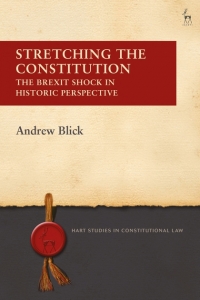In Stretching the Constitution: The Brexit Shock in Historic Perspective, Andrew Blick situates Brexit within the wider context of UK constitutional reform debates over the course of the past century. Blick’s unconventional approach to this topic is insightful, providing instructive historical context to contemporary discussions of Brexit that will be of particular value for scholars of constitutional affairs, writes Gary Wilson.
Stretching the Constitution: The Brexit Shock in Historic Perspective. Andrew Blick. Hart. 2019.
The phenomenon of Brexit has generated a considerable body of literature, much of which either seeks to understand the reasons why the UK voted to leave the European Union or assess the likely consequences of departure from the EU. Stretching the Constitution by Andrew Blick, a constitutional scholar, is refreshing in that it employs a unique approach by seeking to place Brexit within the wider context of constitutional reform debates going back over the course of the past century. The author begins from the non-controversial suggestion that the scale of the impact of Brexit has been considerable. The outcome of the 2016 referendum on EU membership immediately led to the resignation of one Prime Minister, has effectively derailed and destroyed the premiership of his successor and has produced major divisions within the two largest political parties – and the cabinet itself – over how to proceed. In addition, Brexit has resulted in challenges to the ultimate status of the UK as a constitutional entity and exacerbated deep divisions in public opinion.
Blick’s approach to making some sense of Brexit is grounded in a consultation of documentary materials which address some of the key constitutional themes that have surfaced during the Brexit debate, either explicitly or implicitly, the result being that Brexit is not regarded as an issue on its own but rather as part of a wider constitutional discussion. Part One of the book makes reference to textual material drawn from the period of Brexit itself, while in Part Two Blick considers aspects of related constitutional debates through the prism of earlier reform proposals produced over the course of the past century. In selecting his materials, the author is clear that he has sought to avoid official governmental or party political materials in order to maintain some objectivity.
The two chapters which comprise the first part of the book have a wide-ranging remit. In the first chapter, Blick draws upon reports of parliamentary select committees to gauge the lessons learnt from the referendum experience, while also touching upon constitutional issues which have arisen since, such as the role of the Supreme Court within the Brexit process, underlined by its ruling in the Gina Miller case. Chapter Two takes a step back to consider the debates which preceded the referendum, focusing on Parliament’s consideration of the 2015 EU Referendum Act which sanctioned its taking place.
 Image Credit: Parliament Square (Leonard Bentley CC BY SA 2.0)
Image Credit: Parliament Square (Leonard Bentley CC BY SA 2.0)
The major part of the book’s flesh is, however, found in the historical retrospect which runs through Part Two. Within these seven chapters, the author identifies and illuminates varied perspectives found in a range of historical writings and touches upon constitutional themes and issues, the significance of which have resurfaced against the backdrop of Brexit. A key point which quickly becomes apparent from this overview is the extent to which constitutional reform proposals advanced several decades – and, in some instances, a century – ago often inadvertently anticipated contemporary constitutional reform debates or continue to be relevant to shaping their parameters.
Given the end objective of those who support the Brexit agenda, Blick appropriately begins by surveying earlier perspectives on the shape and function of multi-state organisations, drawing upon works by L.S. Woolf, Friedrich Hayek, William Jennings and William Beveridge, who had advanced proposals for organisations which bore some features of the modern EU. By contrast, a far more recent plan of Brexit supporters Douglas Carswell and Daniel Hannan is considered, which sets out a vision of the UK’s post-Brexit relationship with other states.
The next two chapters address issues of democracy, focusing respectively on the referendum mechanism and representative democracy. The merits of using referendums within a representative democracy has been controversial in some quarters, although arguments for their use, similar to those advanced in support of the 2016 exercise, are found in earlier writings on the referendum mechanism. The shortcomings of the UK’s system of representative democracy have been highlighted both before and since the 2016 referendum. These must be seen within the context of debates over electoral reform and the redistribution of power within the UK. Again, earlier constitutional reform proposals can be employed to shed light upon some of these issues. Those surveyed within the book range from a 1911 proposal for the introduction of the single transferrable vote to unofficial Conservative proposals for House of Lords reform much earlier than those which the Labour government sought to effect in 1999. Earlier proposals for the decentralisation of power are also touched upon.
The following chapters are concerned with proposals for reform to Parliament, the territorial structure of the UK and the executive branch of government. The role of Parliament has been central to the Brexit process. While limitations in its operation have been illustrated by its inability to reach consensus on a form of leaving the EU acceptable to a majority of its members, concerns over its function are not new. The earlier reform proposals discussed by the author include the advancement of the case for the creation of sub-parliaments by Winston Churchill, amongst others.
To many minds, Brexit threatens the existence of the UK, while the 2016 referendum also gave rise to debates concerning the relative voice which its constituent parts might have within that process. The case for a federal UK is again revisited through the lens of earlier proposals. The varied reform suggestions pertaining to the executive range from those found in the writings of Arthur Ponsonby in respect of the scope for democratic control via the House of Commons, to foreign policy – particularly interesting in light of the extent to which the House has effectively curbed Government’s freedom of action in Brexit negotiations – to Harold Laski’s calls for reform of the civil service.
The final substantive chapter, titled ‘The Digital Constitution’, considers the relationship between digital technologies and democracy. While it is easy to see this as a modern challenge, with few lessons to be learnt from earlier writings, Blick manages to adduce works from HG Wells and others to bring historic perspectives to bear on this issue.
From his survey of earlier constitutional reform proposals, Blick reaches the conclusion that ‘historical analysis shows that the belief that democracy is in peril is far from new’. He questions the legitimacy of the Brexit process, acknowledging that it raised serious constitutional problems, while also noting that shortcomings within the UK’s system of democracy manifested during the Brexit debate have featured in past analysis. Some possible reforms are touched upon: for example, to the House of Lords as a second chamber capable of representing to the UK’s constituent parts and regions, and electoral reform to increase the democratic legitimacy of the UK’s political institutions. These are, however, couched within the context of earlier debates, which by its conclusion the book has clearly demonstrated are of great relevance to contemporary discussions surrounding constitutional reform.
This book is not perhaps one of the more conventional treatments of either Brexit or constitutional reform debates. That is, however, its main appeal. It is able to make an important contribution to the existing body of work within these fields precisely because it does not seek to replicate the usual approaches or discussions. The historical context provided to contemporary debates is insightful, but also very instructive in introducing the modern reader to materials of which they would in many instances have been ignorant or unaware. Anyone who purports to be a scholar of constitutional affairs should read Stretching the Constitution.
Please read our comments policy before commenting.
Note: This article is provided by our sister site, LSE Review of Books. It gives the views of the author, not the position of EUROPP – European Politics and Policy or the London School of Economics.
_________________________________
Gary Wilson – Liverpool John Moores University
Gary Wilson is Senior Lecturer in Law at Liverpool John Moores University. He specialises in collective security, the use of force and issues of secession and self-determination.


 Find this book:
Find this book: 
